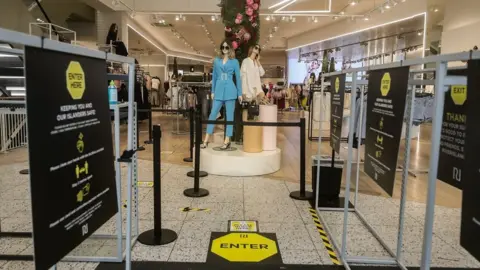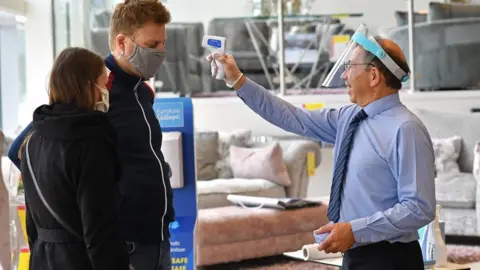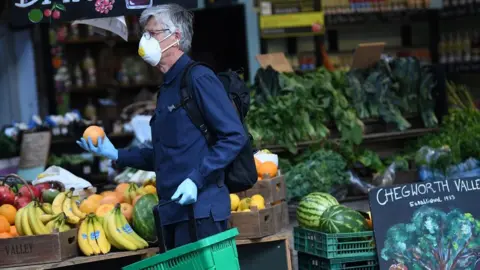Coronavirus lockdown: All shops can open on Monday in England
 PA Media
PA MediaAll non-essential shops will be allowed to reopen in England on Monday, the business secretary has confirmed.
Alok Sharma said "we continue to meet" the government's five tests for lifting coronavirus lockdown restrictions.
He said retailers can open as long as they follow safety guidelines, or they could face enforcement notices.
But asked about the possibility of reducing the 2m social distancing rule, Mr Sharma said "we keep these matters under review" but did not give a date.
He also said pubs, bars, restaurants and hairdressers will not be able to reopen until 4 July "at the earliest".
In Northern Ireland, all shops are allowed to open from Friday. No dates have been set for the reopening of non-essential shops in Scotland and Wales, although each country has set out its planned stages for lifting lockdown.
It comes as the number of people who have died after testing positive for coronavirus increased by 286 to a total of 40,883, official government figures on Tuesday show.
The previous day, the UK had recorded its lowest daily rise in deaths - 55 - since before the lockdown on 23 March. There tends to be fewer deaths reported on Mondays, due to a reporting lag over the weekend.
The number of new confirmed cases in the UK has also increased by 1,387.
Prime Minister Boris Johnson signalled in May that all non-essential shops would be allowed to reopen in England on 15 June.
Confirming that it was still going ahead at the daily Downing Street briefing on Tuesday, Mr Sharma said the change would allow the High Street to "spring back to life".
He said businesses must follow the government's social distancing and hygiene guidelines published last month, and all retailers that open must complete a coronavirus risk assessment.
Enforcement notices can be issued if shops reopen without the safety steps in place, Mr Sharma added.
 Getty Images
Getty Images EPA
EPASome retailers have already said they will open their stores in England gradually from 15 June.
Department store John Lewis will only open 13 branches initially, while Next will only open 25 of its 500 stores at first.
Some shops, such as supermarkets, corner shops, banks, pharmacies and petrol stations have been able to remain open during the coronavirus lockdown.
And others - including furniture stores, open-air markets and car showrooms - were allowed to reopen at the start of June.

How will shopping be different?
Perspex screens at the tills and floor markings to keep shoppers 2m (6ft 5ins ) apart have already become a regular fixture in supermarkets. And those measures are also likely to feature in other shops.
But some more unfamiliar measures are also expected to be put in place to try to reduce the spread of the virus.
Shoe shop Kurt Geiger will put footwear aside for 24 hours after a customer has tried them on, and Waterstones has said it will quarantine books for 72 hours after people have touched them.
Stores have been asked to encourage people to shop alone, if they can, and talk to local authorities about providing extra parking and bike racks where possible, to stop people using public transport.

Pubs and restaurants
Mr Sharma said other businesses such as restaurants, pubs, bars and hairdressers will remain closed until 4 July at the earliest, as per the government's "road map".
Pub companies have called on the government to halve the 2m rule, saying many pubs would struggle to operate.
The trade body UK Hospitality estimated that, with a 2m rule still in place, outlets would be able to make about 30% of normal revenues, whereas 1m would mean about 60-75%.
Asked about the distance, Mr Sharma said: "We, of course, take advice from our scientists and of course when it is safe to do so we will see whether you can move to a shorter distance but ultimately we keep all of these things under review."
He acknowledged that other countries had moved to shorter distances but said "they are further along in terms of their road map, in terms of opening up businesses".

- 40,000 DEATHS: Could they have been prevented?
- FACE MASKS: When should you wear one?
- EUROPE LOCKDOWN: How is it being lifted?
- TWO METRES: Could less than 2m work?
- VACCINE: How close are we to finding one?
- FOOD: How can I shop or get deliveries safely?

It comes as the government dropped its plan to get all of England's primary schoolchildren back for a month before the summer holidays begin in July.
Labour's Rebecca Long-Bailey expressed "dismay" at how the plans for bringing back pupils had been handled, while head teachers' leaders said the plan was never practical.
In other developments:
- People in Wales have been asked to wear face coverings on public transport and other places where social distancing is not possible
- Holiday firms are being warned they face court action if they refuse to give refunds to customers who had trips cancelled because of the pandemic
- Less than one fifth of UK deaths in the last week of May were linked to coronavirus, according to new figures which show the number of weekly deaths continue to fall
- The League One and League Two football seasons have ended early and both tables will be settled on points per game
